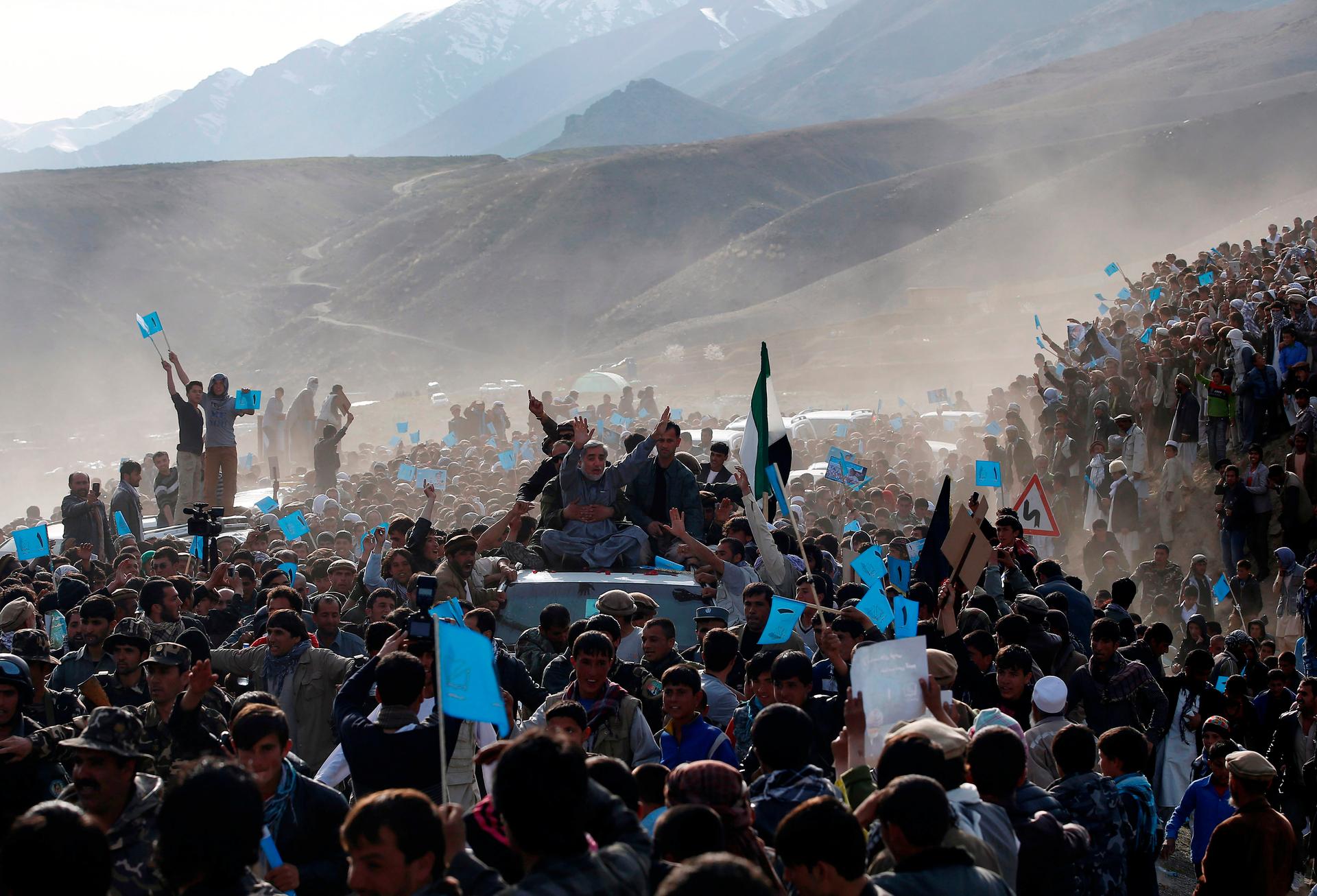Despite violence, Afghans are more determined than ever to vote in the upcoming presidential elections
Presidential candidate Abdullah Abdullah (in grey), sitting atop a vehicle, arrives for an election campaign in Panjshir province March 31, 2014. The Afghan presidential election will be held on April 5.
This Saturday Afghans will vote in what may be their most crucial election since the fall of the Taliban, the presidential race to replace President Hamid Karzai.
Karzai has been in power since 2001.
It's the third election since the Taliban's fall, but for the first time, term limits will bar Karzai from the ballot.
With 11 candidates running, the race appears wide open.
The election will also be the last before the withdrawal of NATO troops later this year, which means the new president will face the challenge of coping with likely attempts by the Taliban to regain power.
Taliban attacks won't be new threat, though. Earlier on Wednesday, the group claimed responsibility for a deadly attack on the same ministry that's supposed to provide security for the elections this weekend.
You might think the threat of voilence would deter Afghans from going out to vote. For many Afghans though, it only seems to drive their desire.
Mujib Mashal, an Afghan journalist based in Kabul, recently covered the Afghan voting registration process for Harper's Magazine, and went through the process himself earlier this week.
"The lines were huge," he said in an interview. "I went one day at nine in the morning and the line was so long it wasn't moving at all. I asked people in the front of the line what time I should come the following day to ensure that I get a voter card, and they said come at four in the morning. And that's what I did. I went with a friend at 4:30 in the morning, waited for six hours, and finally got my card around noon."
Mashal added that voting is a chance for Afghans to "try to speak up against incidents of voilence and ensure the continuity of the fragile democratic process in Afghanistan."
Current voter registration numbers and projections for the size of Saturday's turnout suggest Mashal may be right.
But what will actually happen — and who will will — remains to be seen.
Update: A previous version of this story incorrectly spelled Mujib Mashal's name. We regret the error.
This Saturday Afghans will vote in what may be their most crucial election since the fall of the Taliban, the presidential race to replace President Hamid Karzai.
Karzai has been in power since 2001.
It's the third election since the Taliban's fall, but for the first time, term limits will bar Karzai from the ballot.
With 11 candidates running, the race appears wide open.
The election will also be the last before the withdrawal of NATO troops later this year, which means the new president will face the challenge of coping with likely attempts by the Taliban to regain power.
Taliban attacks won't be new threat, though. Earlier on Wednesday, the group claimed responsibility for a deadly attack on the same ministry that's supposed to provide security for the elections this weekend.
You might think the threat of voilence would deter Afghans from going out to vote. For many Afghans though, it only seems to drive their desire.
Mujib Mashal, an Afghan journalist based in Kabul, recently covered the Afghan voting registration process for Harper's Magazine, and went through the process himself earlier this week.
"The lines were huge," he said in an interview. "I went one day at nine in the morning and the line was so long it wasn't moving at all. I asked people in the front of the line what time I should come the following day to ensure that I get a voter card, and they said come at four in the morning. And that's what I did. I went with a friend at 4:30 in the morning, waited for six hours, and finally got my card around noon."
Mashal added that voting is a chance for Afghans to "try to speak up against incidents of voilence and ensure the continuity of the fragile democratic process in Afghanistan."
Current voter registration numbers and projections for the size of Saturday's turnout suggest Mashal may be right.
But what will actually happen — and who will will — remains to be seen.
Update: A previous version of this story incorrectly spelled Mujib Mashal's name. We regret the error.
Our coverage reaches millions each week, but only a small fraction of listeners contribute to sustain our program. We still need 224 more people to donate $100 or $10/monthly to unlock our $67,000 match. Will you help us get there today?
